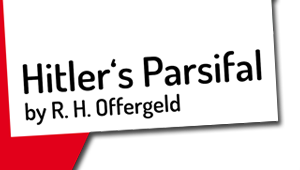Many times I was asked in interviews for my motivation to write a book on Bayreuth and Richard Wagner.
I don`t want to deny it: in the beginning I had no relationship to Richard Wagner at all, (I didn`t like the music and) I completely ignored him. Wagner and Bayreuth were standing for Hitler and the Holocaust.
I had my first real contact when my editor asked me to do a feature for the German Radio about the „Myth of Bayreuth“. We wanted to find out: What are the reasons that still every year more than 50 000 people go on a pilgrimage to this Festival. If you want to have a ticket you will be put on a waiting list and have to wait for ten years.
So I did many investigations, interviews with historians , musicians, with people who love Wagner and people who hate him. All of my investigations and interviews taught me how controversial the topic Bayreuth still is. I was particularly interested to find out how foreigner feel on Bayreuth, on its past, on Wagner`s Anti-Semitism, and
Hitler´s adoration for him. So I created my main protagonist Alma Rosen, a New York based writer, who had lost her relatives in the Holocaust.
From many interviews I also learned that most foreigner coming from all over the world to Bayreuth are much more relaxed with the topic than we are. We Germans are still so traumatized by Hitler and the Nazis.
For instance, the English, surprisingly, are very interested in the mysticof Wagner`s music dramas. They love Parsifal. The French see in him the great poet, who was able to translate speech into music. They compare him to their greatest poet Charles Baudelaire, who was one of the first Wagnerians. In the U.S., however, the attitude to Wagner is completely different. I was especially fascinated by the book of Marc A. Weiner, „Anti-Semitic Fantasies“ in the music dramas of Richard Wagner. Weiner is a leading American Jewish musicologist. He demonstrates in his book that the Jewish figures in Wagner are the most complex and interesting ones, in their negative designed characters. And, of course, in Israel it is still impossible to perform Wagner`s music of any kind. I can really understand that. I read Paul Lawrence Rose „Race and Revolution“ and Bayrry Millington` „Wagner Performance“. Another two excellent research work on Wagner.
We talked on history. Let`s now talk on Wagner`s music. Again we have lots of pros and contras. His music is often perceived as not particularly differentiated, as noisy and gloomy. But this impression you often have listening to musicians from the Romantic, Berlioz, for example, too.
It was Daniel Barenboim, the great conductor, who has helped me to find a new approach to Wagner and his music. In an interview he asked me to listen carefully especially on the chamber music parts of Wagner`s compositions. He mentioned the „Karfreitagszauber“ from the music drama „Parsifal“ or the prelude to „Das Rheingold“. These wonderful pieces of music also show the great composer who he was. Nevertheless Wagner had a detestable character and his anti-Semitism cannot to excused, by nothing.
Listen to the „Karfreitagszauber“, conducted by the famous Sergiu Celebidache:
Detective Firmian von Dall´Armi, the other protagonist in the novel , has its own way to reflect on this topic.. An interesting relationship between and Alma starts.
Why did I use the form of a mystery novel? I myself like mystery novels. Bayreuth is a great setting for a thriller, this small provincial town has nothing lost of its particularity, it is a wonderful medieval and baroque town, with many contradictions and still shows many of the historic situations of Nazi Bayreuth.
The Festival House of Richard Wagner was a world sensation in the 19th Century where not only musical history was written.. Here in the Festival House the Nazi-murderer applauded even the Jewish artists on stage. At the same time they organized their extermination. Bayreuth has a prison in the middle of the city, which was once a baroque palace (!). How incomprehensible to change an ancient castle into a jail! Right behind that jail, in which Jews and other opponents of the Nazi- regime were kept prisoner, is situated the little railway station of St.Georgen. From there the transports to the Concentration Camps Dachau and Flossenbuerg started. Another historical particularity: a synagogue that was built wall on wall on a famous 17th century opera house. The Nazi didn`t dare to burn down that synagogue because it would have destroyed the ancient Opera House as well. Rabbi Kohn in the novel is a contemporary witness of the Jewish community of Bayreuth.
In the “Richard-Wagner-Nationalmuseum”, you can find a highly protected correspondence between Hitler and the Wagner family, which has, against any scientific rules, never ever been published.
The most exciting question for me is: What is written in these private letters which Hitler wrote to the Wagner family? Historians suppose that in this correspondence Hitler might have written about his plans to annihilate the European Jews. If that would be true it could be a catastrophe for the Festival as a whole. But so far no one has access to these letters, not even the renowned historian Brigitte Hamann and other historians who have tried it.
In fact, it’s a great thriller plot: Hitler`s letters disappear from the safe of House Wahnfried. The next day, the director of the archive is found dead. Who is the murderer? Suspicion was cast on Alma Rosen …
